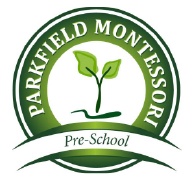Early Years Foundation Stage Curriculum alongside the Montessori Curriculum
The EYFS curriculum is broad and balanced. It is divided into seven areas of learning. There are three Prime Areas and four Specific Areas. Each area having a set of developmental steps and ‘Early Learning Goals’ which determine what children are expected to achieve by the end of the Foundation Stage.
The Prime Areas:-
- Personal, Social and Emotional Development
- Communication and Language
- Physical Development
The Specific Areas:-
- Literacy
- Mathematics
- Understanding of the World
- Expressive Arts and Design
1. Personal, Social and Emotional Development
We place a great deal of emphasis on this particular area because it is at the heart of all other learning. It takes into account the individuality of each child and the need for time and space to develop fully. During their time at pre-school the children will grow in self-confidence. They will be encouraged to do things for themselves, look after equipment in class and take themselves to the toilet independently.
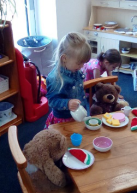
2. Communication and Language
Speaking and listening forms a vital part of the children’s daily experience. Children learn to interact with others; listen attentively; speak clearly and audibly. They will explore the meanings of new words and use talk to organise and clarify their thinking and ideas. The children will listen to and follow instructions. They will develop such skills in a variety of ways including topic time, show and tell, circle time, role play, storytelling, reciting rhymes etc.
3. Physical Development
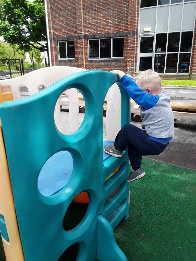 The children will enjoy a variety of activities, both inside and outside, aimed at improving their skills of co-ordination, control, manipulation and movement. The children learn about what they need to do to keep themselves healthy.
The children will enjoy a variety of activities, both inside and outside, aimed at improving their skills of co-ordination, control, manipulation and movement. The children learn about what they need to do to keep themselves healthy.
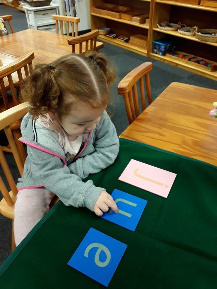
4. Literacy
Reading:
We learn the phonetic sounds of letters using Sandpaper letters. Emphasis is placed on the phonetic sound each letter makes e.g. "a" as in apple (not apron); "c" as in cat (not cedar). This leads to a good foundation of sounds to assist the children in their reading and word building
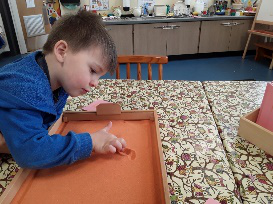 Writing:
Writing:
When using the sandpaper letters, the children learn to trace around the letter shape, this brings in the muscular memory which helps the children when they are ready to start mark making and writing for themselves. The children also practise many skills to help strengthen and develop muscular control. If your child writes at home, please encourage them to use the correct pencil grip as bad habits can be hard to break. Please use lower case letters and not capitals.
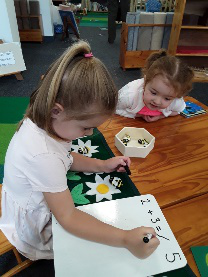
5. Mathematical Development
We will develop your child’s mathematical knowledge and skills through varied practical activities including counting, sorting, making patterns, games, early addition and subtraction, shape, measuring, weighing and capacity.
6. Understanding of the World
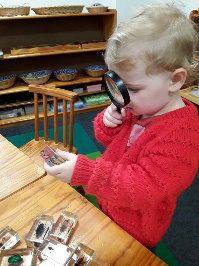 This area focuses on children’s developing knowledge and understanding of their environment, other people and features of the natural and man-made world. It provides the foundation for scientific, technological, historical and geographical learning.
This area focuses on children’s developing knowledge and understanding of their environment, other people and features of the natural and man-made world. It provides the foundation for scientific, technological, historical and geographical learning.
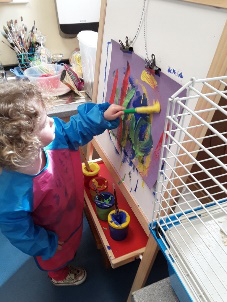
7. Expressive Arts and Design
The children are given many opportunities to explore and express their own ideas through art and design, movement, drama, music, stories and role-play. Some of their creations will be displayed in the classroom but the majority will be brought home to adorn your fridge.
Parkfield Montessori Pre-school blends the Early Learning Goals with the Montessori Curriculum to help your child build strong foundations on which develop their intellect.
Dr Maria Montessori was a remarkable woman. The first woman in Italy to qualify as a medical doctor, she became interested in how children learn and took a scientific approach to observing children's learning and development. Her research and work with children of wide-ranging backgrounds and abilities developed into an educational approach that spread around the world. More than 100 years on the Montessori approach is globally recognised and Dr Montessori's work continues to inform modern educational practice.
Our highly qualified Montessori teachers carefully prepare a child-centred environment designed to offer experiences that will intrigue, inspire and challenge young minds. In an environment that is specifically designed to meet each child's learning and developmental needs, our children:
- develop confidence and independence
- learn at their own pace
- follow their own interests
- discover that learning is fun
- develop an enthusiasm for learning that will stay with them throughout their lives
In our Practical Life area children enjoy practical activities, such as pouring, pegging, threading, matching lids to containers, using tweezers or tongs and being introduced to real tools. These activities are fascinating to young children and whilst they explore they are developing key skills such as hand-eye coordination, fine motor skills, and attention to detail that will be needed later for reading and writing.
Young children naturally seek to be independent. From the very start our children begin to take responsibility for small tasks, such as laying the table, sweeping and mopping, preparing snacks, washing up and independently managing their coat and shoes. The belief that "I can do it by myself" gives children confidence to embrace challenges with a positive, "can-do" attitude that is essential for successful learning.
The Sensorial materials encourage learning and discovery using all the senses. In this area children are introduced to lots of new vocabulary as they investigate colours, length, height, weight, texture, sounds and shapes. Through hands-on learning children develop a practical understanding of new concepts.
The Sensorial materials encourage children to explore and to try out their own ideas. As children discover new ways of doing things, they learn that their ideas may not always work the first time and that it is ok to adapt their approach and to try again. This adaptability and resilience when things do not go to plan, coupled with the sense of pride when they achieve their goals, are skills that prepare children both for future learning and for life.
The Language materials introduce children to phonic sounds. Before letters are introduced, lots of opportunities are provided to develop pre-reading skills through rhymes, storytelling, listening games, and playing with words and sounds.
Our Book Corner provides a cosy spot to look at books independently or with a friend. Teachers are always on hand to read a story or to help look up information about a child's latest interest.
Once they are familiar with the phonic sounds that letters make, children begin to build words and to blend sounds together to read.
Opportunities for mark-making and writing are available throughout the classroom, both indoors and outdoors. Writing develops naturally as children become familiar with the shapes of the letters and use the fine motor skills that they have practiced in Practical Life to perfect a correct pencil grip.
Children learn about numbers and quantities using the hands-on Maths materials. By handling quantities and amounts, moving them around, discovering how they compare to each other and how they can be changed children develop a true understanding of how maths works. By matching numbers to the quantities that they represent children understand what the numbers mean and learn how to count with meaning rather than reciting numbers by rote.
The Montessori Cultural materials introduce children to new aspects of the wider world. They encourage children to think and to ask questions - which often develop into child-led topics that really capture the children's interest!
Through nature studies, science experiments, cooking, art projects, learning about different countries and cultures, and investigating topics that interest them, children discover that the world in which they live is a fascinating place.
Event Calendar | Latest News |
